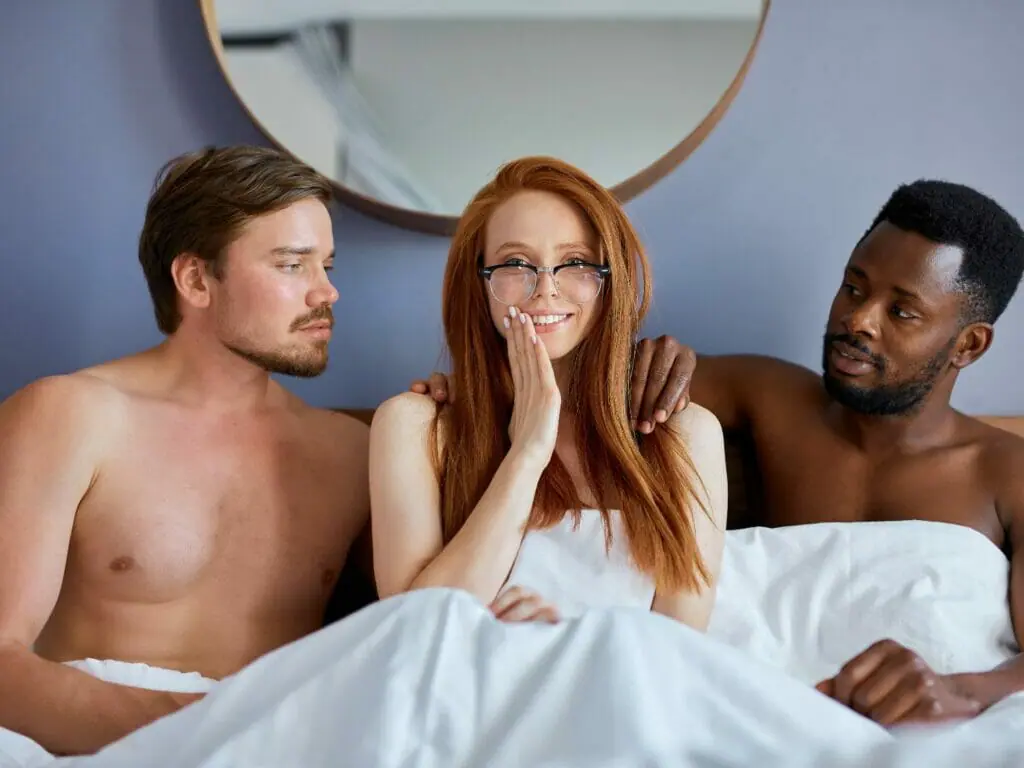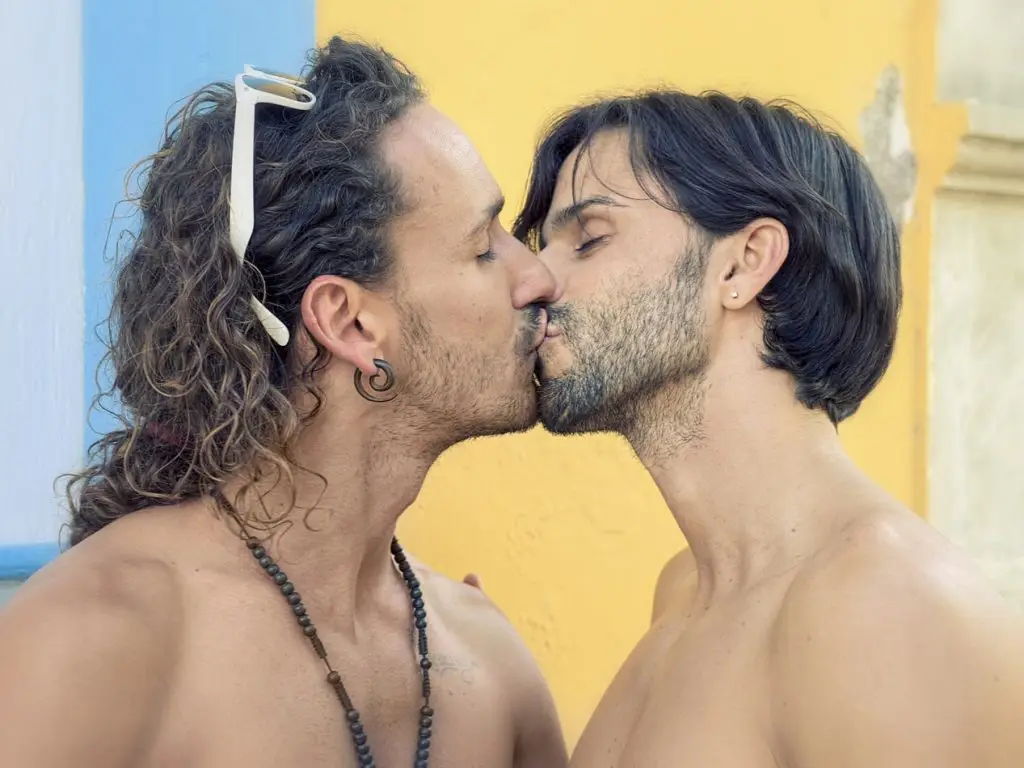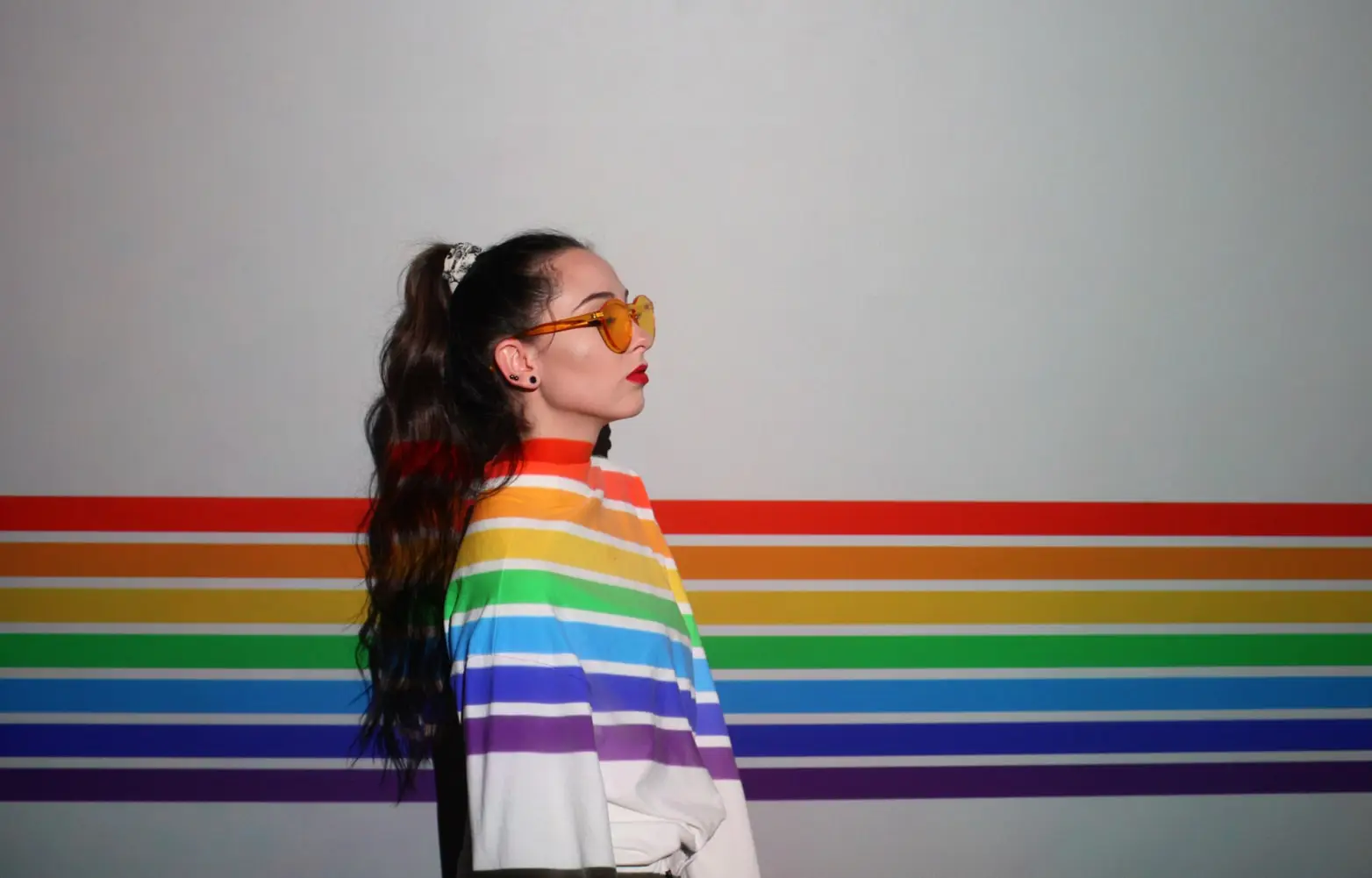It’s a wonderful thing to see increasing LGBT representation in the movies. While awesome films with queer characters can be found even decades ago, they were few and far between; nowadays, cinema-goers have a much better chance of seeing even-handed portraits of gay characters than before.
However, one group that remains under or unfairly representative is bisexuals. Often a bisexual character is played for laughs, is a confused queer character, or (on the darker side) their bisexuality is evidence of their grotesqueness. Female bi characters also suffer from being portrayed solely through the male gaze for titillation.
Luckily, there are several fantastic exceptions to this, and we can only hope that the number of options for this list of our top bisexual movies will grow as people become more open-minded.
Enjoy these acclaimed films, and let us know if there are any we’ve missed! And if you are still yearning for more romance, check out these bisexual romance novels (before they get picked up by the silver screen…)

Wondering where to watch? It depends on where you live in the world and which streaming services you have. We link to the streaming service we watch on in each case - be it Netflix, Amazon Prime, Apply TV+, or elsewhere.
You can get one month free of Amazon Pride (or a 6-month trial for students) of Amazon Prime and also get immediate access to FREE Two Day shipping, Amazon Video, and Music. While you won't be charged for your free trial, you'll be upgraded to a paid membership plan automatically at the end of the trial period - though if you have already binged all these, you could just cancel before the trial ends.
Apple TV+ also has a one-week trial, and Hulu has a one-month trial (which can be bundled with Disney!). Another option might be using a VPN to access Netflix titles locked to other regions. Netflix is now available in more than 190 countries worldwide and each country has a different library and availability. US Netflix is (understandably) one of the best.
While we wish everything could just be in one place - for now, it seems these are the best streaming platforms to watch on.

In this article we will cover...
- Shiva Baby (2020)
- Cabaret (1972)
- Memories of a Teenager [Yo, adolescente] (2020)
- Frida (2002)
- Tully (2018)
- Atomic Blonde (2017)
- The Dreamers (2003)
- Chasing Amy (1997)
- Black Swan (2010)
- Velvet Goldmine (1998)
- Jennifer’s Body (2009)
- Appropriate Behaviour (2014)
- Love Songs (2007)
- The Comedian (2012)
- And Your Mom Too (2001)
- Margarita with a Straw (2014)
- Gia (1998)
- Stage Beauty (2004)
- Booksmart (2019)
- My Own Private Idaho (1991)
Shiva Baby (2020)
Nothing goes as expected when Danielle (Rachel Sennott), a bisexual Jewish college senior, attends a shiva with her parents.
During mourning day, Danielle encounters both her ex-girlfriend and her current sugar daddy, who is accompanied by his wife and their baby. She’ll have to uncomfortably face her lovers, old and new, surrounded by the judgmental eyes of family and friends. Shiva Baby is filled with comical cringe-inducing moments, and some tense ones too. It’s definitely one of the best dark comedies in recent years.
We love Danielle’s characterization as a messy and chaotic bisexual woman. The situations that she finds herself in slowly start to chip away at her sanity, becoming more and more unhinged as the day goes on. We see her having to juggle her family life, her career prospects and her love life as she traverses this shiva.
It also portrays the parental pressure that hangs over some bisexual women: even though they love both men and women, conservative parents pressure them into marrying a man. This is the case with Danielle’s parents (who are played by the great Polly Draper and Fred Melamed). While his father is not privy to her sexuality, Debbie, her mother, knows about her and Maya. During the day, Danielle will have to deal with her mother’s looks as she tries to connect with her former girlfriend.
Perhaps what’s best about the movie is that Danielle gets a beautiful resolution to her struggles at the end. We won’t spoil the movie, but we will say that it’s satisfactory to see this kind of ending for a queer character, who often gets the short end of the stick.
Shiva Baby is a splendid movie that you should watch whenever you get a chance. Be prepared to feel secondhand embarrassment and strong emotions as well!
Cabaret (1972)
Super-stylish, super-creative and super-sexy, this absolute queer classic also takes an open and refreshing approach to bisexuality – essentially, it doesn’t make it a big deal at all.
Michael York’s innocent writer in Berlin initially declares himself gay in response to Sally Bowles’ overt passes at him, before starting a relationship with her; only for them to later realize they’ve each been having an affair with the same man. The relationships might be complicated, but the film never singles York’s character out as odd – he simply is attracted to men and women.
Memories of a Teenager [Yo, adolescente] (2020)
Memories of a Teenager was a surprising hit among queer Latinx circles. Telling the story of a young Argentinian boy nicknamed “Zabo” during the 2000s, the film is an adaptation of Nicolás Zamorano’s novel of the same name.
Both the film and the novel are based on the true story of Zamorano’s teenage years. While a part of the audience may be shocked by the kind of adolescence that this film portrays -filled with partying, depression, and heavy drug use-, others may identify themselves with the main character.
This film begins with a sad event: the tragic suicide of one of Zabo’s friends. Trying to deal with the grief of losing a friend, Zabo decides to open a blog where he will express himself. Here, he will write about death, school life and love. One thing, in particular, seems to be in Zabo’s mind as the school year goes on: does he like girls or boys? With the help of his blog, he will try to discover his true identity, in a context where divergent sexual identities weren’t openly discussed.
Many queer watchers will see themselves in Zabo, especially in the ways he uses the internet and blogging to figure out his sexual identity. In this day and age, the web is a key instrument in every young queer life. Is the way that many of us got exposed to queerness and learned about other LGBTQ people. Memories of a Teenager does a great job of capturing this aspect of queer life.
We also love how it shows Zabo’s awakening as a young bisexual, having him discover his interest both in women and men at the same time.
Frida (2002)
We’ll be honest, we find it a little tricky having this on our list of top bisexual movies after hearing lead actress Salma Hayek’s disturbing account of Harvey Weinstein’s role in the production. Nevertheless, it is a fantastic film and an unflinching account of Frida Kahlo’s complicated life and relationships.
She was a bisexual woman; she was also passionate, talented, independent and difficult. These things are honestly represented in the film without her bisexuality needing to be a defining characteristic.
Tully (2018)
Few films are as poignant and touching as Tully. Created by the duo behind the iconic Juno (with Jason Reitman directing and Diablo Cody writing), this film dives deep into the relationship between an exhausted mother of three and her young and hopeful nanny.
It’s a refreshing take on a bisexual main character: Charlize Theron’s Marlo is a complex person in a bad place in her life. She will feel closer to her sexuality and herself thanks to Tully, the titular nanny played by Mackenzie Davis.
Although, at the beginning the movie, the two of them couldn’t be more different. Marlo is a bisexual woman who has left her partying days behind: she married and now cared for three young children. It’s clear that her situation saddens her, to say the least; one could even argue that she’s undergoing postpartum depression.
Her brother is the one that notices her exhaustion, so he pays for Tully to help her with the house and the children. Tully, on the other hand, is a sweet and carefree woman in the flower of youth: she’s in an open relationship with her gay roommate and lives life at its fullest. As the nights go by, Marlo and Tully become more and more closer (to the point where they take it to the bedroom!).
Yet, after that, their relationship starts to fall apart. From this point on, the movie becomes something more than you would’ve expected. For those of you who wouldn’t mind knowing a little bit about the film’s ending, here’s a little spoiler: by the time Tully ends, you will want to watch it more than one time. It takes a mind-bending turn that truly drives home all the themes the movie has been addressing.
Tully is a film about love, particularly self-love, and aging.
Atomic Blonde (2017)
This is a rare beast indeed: an action thriller with all the fight scenes and unrealistic spy plots of a Bond film, with a leading woman who happens to be bisexual.
As she stalks in stilettos through the streets of post-Cold-War Berlin, Charlize Theron’s M16 spy has romantic encounters with both men and women with no self-doubt or navel-gazing. If you’re not a fan of the genre, it’s probably not the right film for your next bisexual movie night – but it’s good to know that it’s out there!
The Dreamers (2003)
Set in Paris during the student riots that shook the whole country in the 1960s, The Dreamers captures the rebellious spirit of the time through the captivating story of three French avant-garde teenagers that become involved in a bisexual love triangle.
We haven’t seen many people discuss this film in queer circles, which is a shame. It’s not every day that you see a film from 2003 with such an ahead-of-its-time portrayal of sexually liberated teenagers. The film doesn’t objectify them or showcase them for the audiences. It truly captures the rebellious attitude from that time.
Based on the 1988 novel The Holy Innocents, the film follows an American exchange student, Matthew, as he travels to Paris to study filmmaking. From the get-go, the film shows the French film students revolting, protesting the firing of a famous film archivist. In this protest, Matthew befriends cinephiles Théo and Isabelle, who are twins.
As they get to know each other, Matthew realizes that the twins are much more sexually aware and progressive than he’s used to. The thing is, instead of recoiling from that, Matthew likes it. Quickly the three of them find themselves in a love triangle, with each of the siblings becoming lovers with Matthew.
The Dreamers was one of Bernardo Bertolucci’s last works. This emblematic Italian director was known for always pushing the boundaries: in 1972 he released Last Tango in Paris, a film that sparked an enormous controversy regarding its graphic depiction of sexual content.
With this film, Bertolucci tackled controversial themes (for the time) once more. But instead of The Dreamers being met with sympathy, it was mostly ignored. Thankfully, we can still enjoy it and praise it for being an important stepping stone for young queer cinema.
Chasing Amy (1997)
Chasing Amy has all the hallmarks of a Kevin Smith film – plenty of swearing, filthy humor, questionable jokes – but is also a surprisingly tender look at falling in love. Ben Affleck plays Holden, who meets and is immediately attracted to Alyssa, a lesbian comic book artist.
When she reciprocates his feelings, you might initially think this is some kind of basic conversion movie. However, that’s not the case, and the plot explores slut-shaming, friendship and how much easier it sometimes is for bi people to simply identify as gay.
Black Swan (2010)
There’s nothing quite like a great psychological thriller to keep you thinking for the rest of the week about what you have seen. Black Swan is that kind of movie.
Deep and thoughtful, it offers a very interesting take on the darker side of ballet. We want to make sure that you understand this: this is a dark movie. It touches on some heavy themes like harassment, abuse and self-harm. If you think you can handle these issues, then we urge you to take a look at this film masterpiece.
The New York City Ballet company decides to put on a production of Tchaikovsky’s Swan Lake. This classic ballet features two main roles: the delicate White Swan and the sensual Black Swan. While the part for the Black Swan is given to Lily (Mila Kunis), a talented yet messy new dancer, the envied role of the White Swan goes to Nina Sayers, a master of technique.
She may be the best dancer and the director’s favorite, but the pressure she’s under will make her lose her sanity, little by little. For her incredible portrayal of Nina, Natalie Portman’s an Academy Award for Best Actress.
One of the main themes of the movie is desire: the need to dance and to be the best at it. As she loses her grasp on reality, Nina starts wanting more. She desires Lily’s role, the Black Swan, and she desires Lily herself. Perhaps another example of a chaotic bisexual, Nina finds herself thinking about her competitor and even going to bed with her.
Black Swan depicts Nina’s descent into madness by showing how her very controlled world collapses into itself. It’s a great film with a troubled and layered protagonist. While she may not be a bisexual heroine, Nina is indeed one of the most interesting bisexual characters ever created.
Velvet Goldmine (1998)
This 90s movie has become something of a cult film for, among other things, its nuanced depiction of bisexual characters. Christian Bale plays a journalist in the 80s tracing the story of glam rock star Brian Slade (Ewan McGregor) back at the peak of his fame (and the music’s popularity) in the 1970s.
Flashbacks and vignettes show the decadence of this time, but also the openness and how rock influenced the gay culture of the time. Bale and McGregor might mark it as a very 90s film, but the story perfectly evokes the mood of the 70s.
Proud bi characters like here are ones we’re always happy to see on our screens.
Jennifer’s Body (2009)
Jennifer’s Body is a comedy horror film turned feminist cult classic. It sees Megan Fox embodying the titular character, a killer schoolgirl with a supernatural twist.
Besides her, even in the worst of times, is her friend Needy (Amanda Seyfried), who shares a deep connection with Jennifer. It’s a movie told from and for the female perspective. With a team that includes filmmaker Karyn Kusama and writer Diablo Cody (who also wrote Tully), Jennifer’s Body has risen over its original box-office bomb and is now hailed as one of the best female-centered films of the decade.
The film tells the story of Jennifer’s death and posterior demonic possession. After a concert gets canceled due to a fire, Jennifer and Needy are left with nothing to do for the night. While Needy decides she’s had too much for a night, Jennifer stays and meets the band they went to see.
Yet it turns out that the members of this band are devil-worshippers who use her as a sacrifice in a demonic ritual. It doesn’t go as planned: since Jennifer wasn’t a virgin, the ritual goes awry and a demon possesses her, killing and eating the whole band. The demon is hungry for human flesh, yet Jennifer will only kill boys: they were the ones that did this to her.
Jennifer’s Body is one of the few horror films that features an empowered woman as an antagonist, turning tired tropes like that of the “virgin” and the “final girl” over their heads. Since female characters are constantly objectified by the media, the women behind the film decided to show this objectification in a new light: Jennifer uses her body to attract new victims.
You may have noticed we didn’t mention bisexuality yet. It’s there, and it’s incredible, but we shall not spoil it for you. Rest assured that Jennifer’s Body will fill all your bisexual needs while also delivering an ahead-of-it’s-time take on horror films.
Appropriate Behaviour (2014)
There’s every chance you haven’t heard of this wonderful film, which makes us sad but not surprised. Once you’ve watched it, however, you’ll be raving about it to everyone you meet.
Written and directed by Iranian-American Desiree Akhavan (who went on to make The Miseducation of Cameron Post), this film feels intensely personal, telling the story of bisexual Shirin as she encounters romantic turmoil and familial pressure.
While her sexuality is part of her identity, Shirin is clearly much more than that. She, and all of the characters, are treated as fully human and with immense compassion by the filmmaker. It’s also hilarious, which helps!
Love Songs (2007)
From the candid streets of Paris comes this touching musical film about the journey from losing someone to learning to love again. It touches on the different ways we love, both representing gay, lesbian and bisexual love and showing that love is not only about sex. Love Songs is deep and frank. Its characters are all thoroughly loving people. If you’re looking for a film that shows bisexuality and polyamory with honesty, this is definitely it. With a title like Les Chansons d’amour, what could you expect?
This is the kind of movie that catches you with a harrowing twist just at the beginning. The lives of Ismael and Alice are thrown into disarray when Julie dies. The three of them were in a throuple (a relationship of three), and while Ismael and Alice were really close friends and sex partners, they both were crazy in love with the late Julie.
They try to support each other, to fill the void in their hearts, but nothing seems to be enough. One day, a male friend of Alice visits the apartment and falls completely in love with Ismael. This new person in Ismael life is Erwann, and with his help, he will try to get better.
We love the portrayal of bisexuality in this film. In the character of Ismael, you truly can see that being bisexual is not all about the sex, it’s also about the love. At the beginning of the film, we see him in love with Julie and, at the end (spoiler warning!), we see him love Erwann. It’s important to have this kind of representation in movies with bi characters.
As a musical, Love Songs is a love letter to the works of French playwright Jacques Demy. Known for musicals like The Umbrellas of Cherbourg, Demy had a talent for writing about those things that characterize Paris: love and loss. Like Demy’s plays, Love Songs is a film that helps us understand romance better. While it may pack a few punches, watching will make you very happy.
The Comedian (2012)
Hold on to your hats, here’s a film set in London that doesn’t have its characters living in vast riverside flats or in Notting Hill! It’s a refreshingly realistic depiction of life in the UK’s capital when your dreams haven’t quite panned out the way you expected, and it also happens to explore bisexuality.
An aspiring comedian, who works as a call-center employee, falls for a man he meets on a bus – but then also his female flatmate. It’s brutally honest and bleak, but well worth a watch if you’re feeling tough enough!
And Your Mom Too (2001)
Y tu mama también is a one of Mexico’s best movies. This captivating road trip is filled with lust, sex, and some strong bisexual vibes too. Don’t be worried, it is definitely a bisexual film: the character’s journey lets them discover both the placid planes of rural Mexico and their own bisexuality. You should be advised, though, that the movie does touch on some heavy themes by the end. Perhaps that’s what makes it such a great film.
Directed by Alfonso Cuarón, who has gone on to make movies like Harry Potter and the Prisoner of Azkaban or Gravity, it tells the story of two young men who go on a road trip with an older, and much more sexually experienced, woman. This trio is any bisexual’s dream: the men are played by Diego Luna and Gael García Bernal, some of the hottest Mexican actors ever, and the older woman is played by the beautiful Spanish actress Maribel Verdú.
Yet not everything in this movie is about sex. Or rather, it isn’t just about the depiction of sex. And Your Mom Too is a coming-of-age movie and also a story about someone who’s bound to die. The film shows how sexual desire is part of what makes us feel alive, both at the beginning of our adulthood and at the end. It’s a profound film, made all the more moving thanks to the incredible performances of the actors.
We urge you to watch this great film as soon as you can. It’s a must-watch!
Margarita with a Straw (2014)
This Indian drama is bold and original in so many ways. Telling the story of an Indian teenager with cerebral palsy who moves to New York for university, it’s a sensitive and emotional take on sexuality, self-discovery and disability.
Laila falls in love with a blind girl from Pakistan, while being attracted to a male classmate, and trying to reconcile these feelings with her conservative upbringing. Her disability and her bisexuality are both treated realistically but without too much focus – recognizing that people are people first and foremost, before we need to focus on their sexuality or condition.
Gia (1998)
This 90’s hit drama was Angelina Jolie’s breakout role. The film tells the true story of Gia Carangi, the first woman to be considered a supermodel, who quickly rose to fame and found herself struggling with drugs.
We are so glad that in her first big role, Jolie, who is bisexual herself, got to play a character with her same sexual identity. She even won a Golden Globe for her part as Gia. If you haven’t had a chance to see Gia, you should do so as soon as you can: is one of the most iconic bisexual movies we’ve ever seen.
The film begins when Gia is just 17, the day she moves to New York in order to pursue a modeling career. After her harsh upbringing in Philadelphia, with her abusive divorce parents, Gia looks to the big city as the place that will make her dreams come true. And it actually did: she met eminent agent Wilhelmina Cooper and in just a few years became the world’s top model.
During this time, Gia met Linda, a gentle makeup artist who happened to be bisexual herself. The two women entered a deep relationship that lasted for years. Of course, the film does take a tragic turn: among the glitz and glamor, Gia discovered drugs and fell in so deep that they cost her her life.
More than a cautionary tale, the film is a tragic love story. It’s focused on Gia’s sex life, her bisexual lovers, and her loving relationship with Linda. For many, this was the film that led them to the discovery of their own bisexuality. We love it for Jolie’s portrayal of Gia as a sensual woman who feels comfortable with her own sexuality.
Stage Beauty (2004)
As bisexual movies go, this is a difficult one. We really loved this film – and it includes one of the best interpretations of a Shakespeare scene that we’ve ever seen – but we can understand why it might be critiqued for its portrayal of the bisexual male lead.
The man in question is Ned Kynaston, the most acclaimed actor playing female roles in the 17th century, a time when only men could act on stage. His fate interlinks with that of Maria, a young woman who longs for the stage. He has romantic and sexual encounters with both men and women, and Stage Beauty has some interesting moments of exploring the ‘masculine’ and ‘feminine’.
Booksmart (2019)
To be honest, sexuality really isn’t the crux of any of the storylines in Olivia Wilde’s awesome Booksmart – which is what makes it so damn good, in our opinion! Best friends Molly and Amy realize as they finish high school that they never had any fun, and try to use their last night before graduation to party hard. And party hard they do, in a wonderfully natural, real-life-teenager way.
Amy is gay and has a crush on skater-girl Ryan, who then goes on to kiss jock, Nick. Ryan is a confident and unapologetic character who perfectly illustrates that you can’t put bi people in a box, and we are totally here for that representation of bisexuality. Be who you are, and enjoy life!
My Own Private Idaho (1991)
Have you ever wanted to see Keanu Reeves in a queer road trip movie full of longing? That’s My Own Private Idaho.
It’s a gloomy story about young men who work as prostitutes in Portland, Oregon. While Reeves plays the rich son of the mayor, Scott Favor, the late River Phoenix portrays a poor street hustler by the name of Mike Waters. The latter suffers of narcolepsy, living in a constant state of haziness, and constantly dreams of his long-lost mother. Even though they are very different, the pair has something in common: they both want to get away from everything else.
They embark on a journey to find Mike’s mother. During their trip, Mike tells Scott about his feelings for him. Yet Mike assures him he is not gay: he says he only sleeps with men for money. This crucial moment of the movie has to be one of the most moving scenes ever put to film. River Phoenix has something in his eyes every time he watches Reeves. It’s mesmerizing and romantic. And so, so sad.
Created by Gus Van Sant (the mind behind gems like Good Will Hunting and Elephant), this movie was foundational in terms of queer representation. It’s considered part of the “New Queer Cinema” movement, which arose in the nineties after the affluence of queer stories in independent movies. Being gay himself, Van Sant was always interested in portraying the lives queer people.
In My Own Private Idaho, he managed to tell a moving story about bisexuality that’s bound to bring a tear to your eyes.




